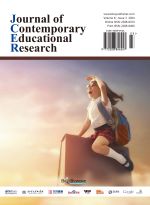Abstract
Innovation ability is the ability to continuously provide new ideas, theories, methods, and inventions with economic, social, and ecological values in the fields of technology and various practical activities. The ideological and political education of vocational school students should be student-oriented and close to reality and life. It is necessary to improve the pertinence, effectiveness, attractiveness, and infectiousness of ideological and political education, and cultivate socialist builders and successors with all-round development of morality, intelligence, physique, and beauty. In this paper, we investigate and understand the practice of innovation ability education in colleges and universities at home and abroad, especially the current situation of professional practice teaching in Xinjiang Vocational Colleges. The construction of a professional practice base in vocational colleges is systematically studied.
References
Ju J, Li X, Ba Z, 2019, Research on the Diversification of Talents in New Subjects and the High-Dimensional Compound Teaching Model. Contemporary Teaching and Research Essays Series, 2019(10): 36.
Tan H, Zhang Y, 2021, The Idea of Logistics Management Talents Training in Tertiary-Level Vocational Colleges Under the New Policy of Vocational Education. Jiangsu Higher Vocational Education, 2021(3): 15–19.
Li L, Li H, Cheng J, 2021, Exploration of Ideological and Political Education Practice in Cultivating Graduate Students’ Innovation Ability. Ideological and Political Education Research, 37(6): 58–61.
Wang Y, 2024, Introduction and Practice Exploration of Standardization of Ideological and Political Education in Mathematics Teaching in Higher Vocational Colleges. Standardization of Educational Administration, 2024(1): 218–220.
